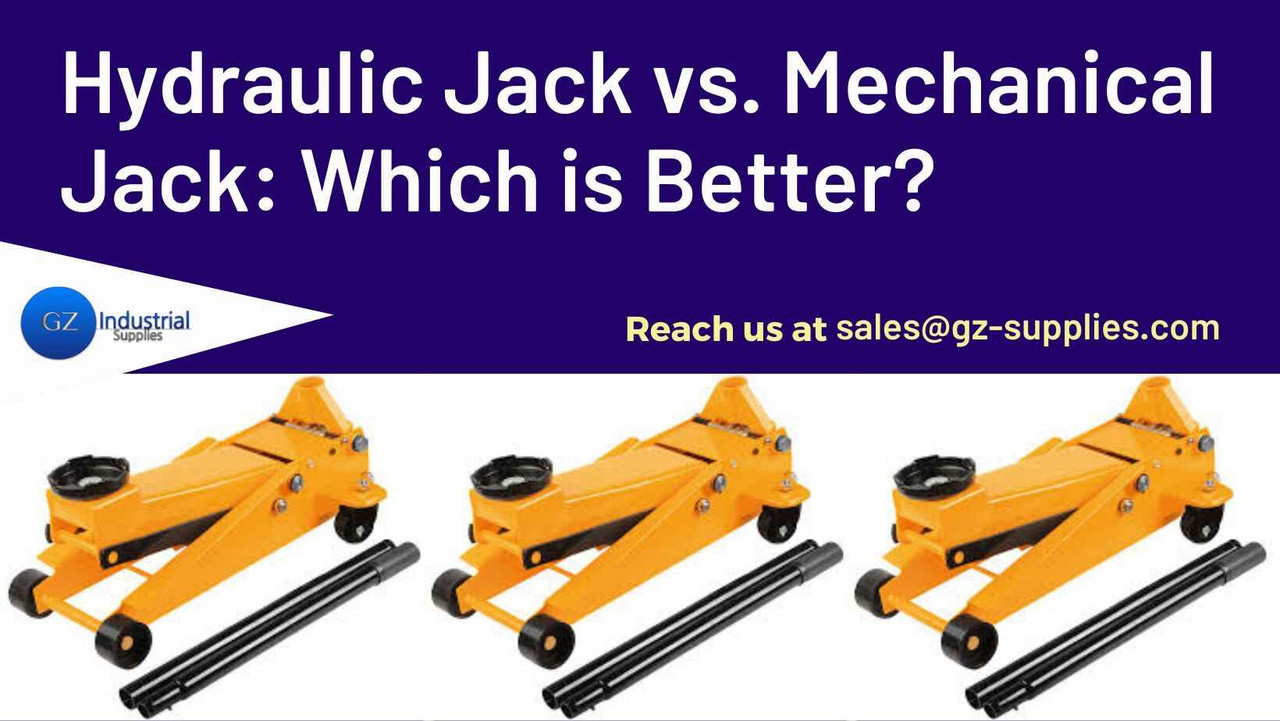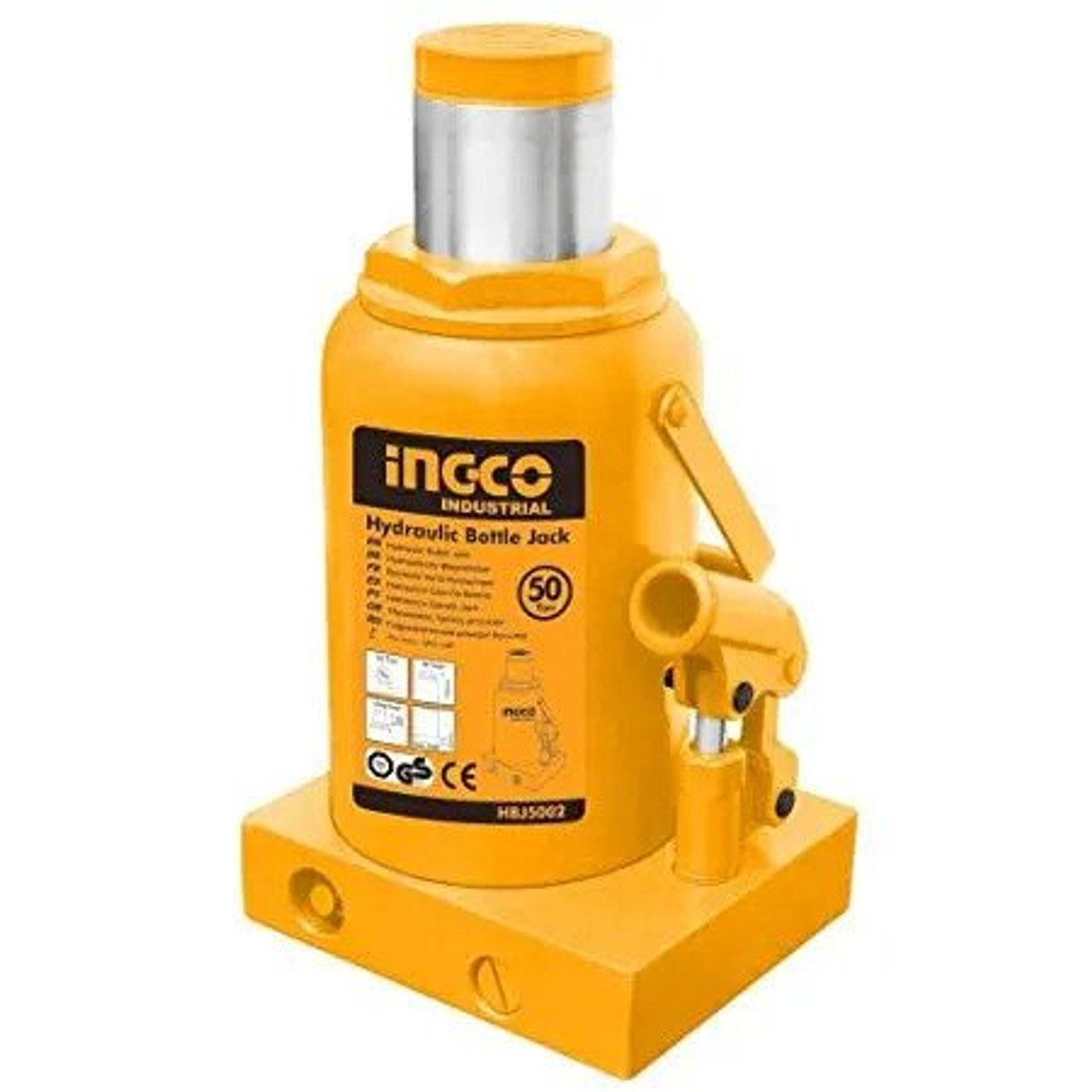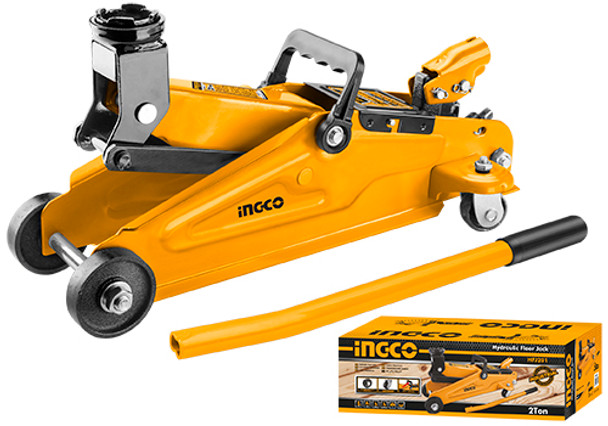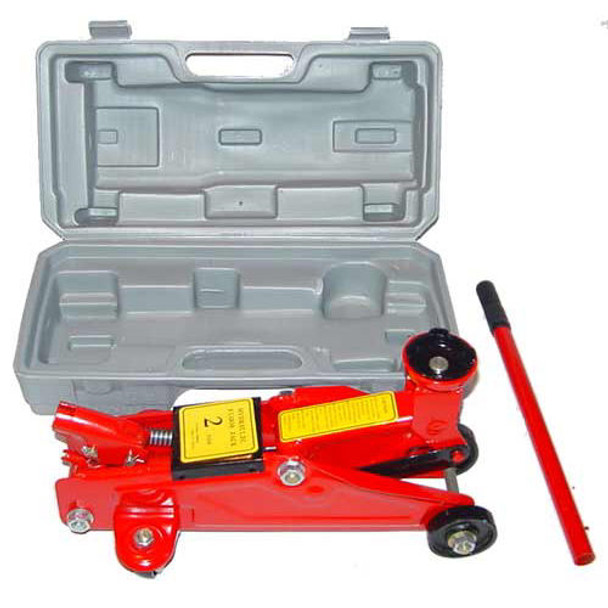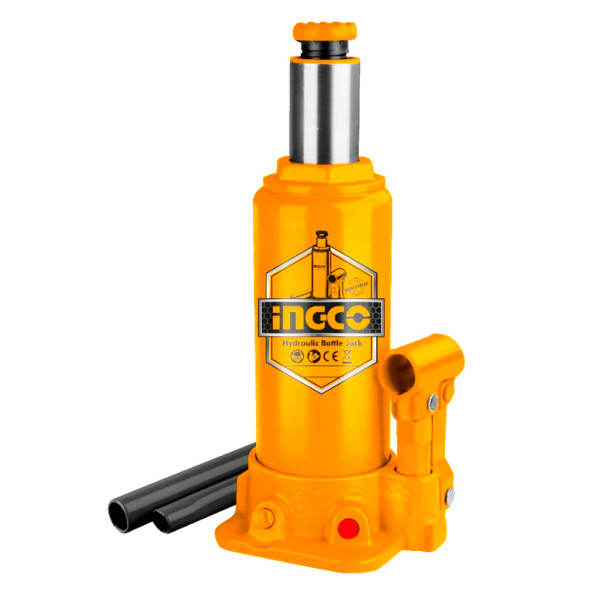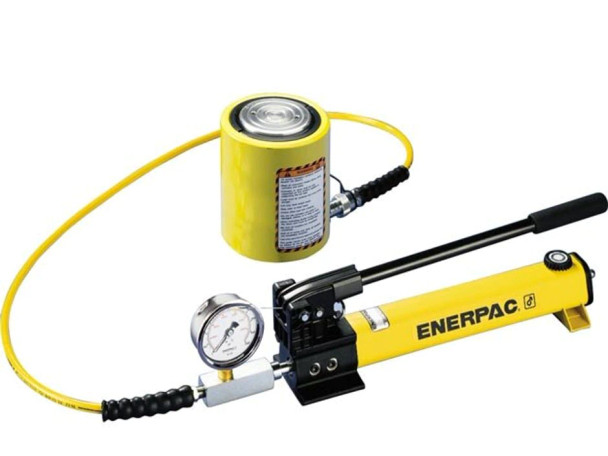Hydraulic Jack vs. Mechanical Jack: Which is Better?
Key Takeaway
- Hydraulic Jacks for Heavy Lifting: Hydraulic jacks, powered by fluid pressure, are ideal for heavy-duty applications due to their high lifting capacity and ease of use.
- Mechanical Jacks for Portability and Cost-Efficiency: Mechanical jacks are lighter, more portable, and often more affordable, making them ideal for emergency roadside use and lighter lifting tasks.
- Maintenance Requirements: Hydraulic jacks require regular maintenance to check fluid levels and prevent leaks, while mechanical jacks need minimal upkeep, enhancing their reliability over time.
Introduction
When choosing between a hydraulic jack and a mechanical jack, understanding their unique features can help determine the best fit for your needs. Hydraulic jacks, such as the INGCO Hydraulic bottle jack 4Ton (HBJ402) or Ingco Hydraulic bottle jack 50 Ton HBJ5002, use fluid pressure to lift heavy loads with ease, making them ideal for automotive repairs and industrial tasks that demand high lifting capacities. They provide smooth, powerful lifting with minimal effort, but require regular maintenance to avoid leaks. Mechanical jacks, like the Pro-Lift Scissor Jack or Hi-Lift Farm Jack, rely on manual operation and are simpler in design, making them more portable, budget-friendly, and easy to maintain. This makes them suitable for lighter tasks, emergency roadside repairs, or situations where mobility is essential. Ultimately, hydraulic jacks are best for those needing frequent, heavy-duty lifting, while mechanical jacks offer a dependable, low-cost option for occasional and lighter applications.
Hydraulic and mechanical jacks serve the same purpose but use different mechanisms to raise and hold heavy loads. Understanding the differences, advantages, and limitations of each type helps users make informed decisions, improving safety, reliability, and convenience.
This guide explores the key features of hydraulic and mechanical jacks, compares them based on performance factors, and provides insights on selecting the right jack for specific applications.
Ingco Hydraulic bottle jack 50 Ton HBJ5002
Understanding Hydraulic Jacks
How Hydraulic Jacks Work
Hydraulic jacks operate on Pascal’s principle, which states that pressure applied to a confined fluid is transmitted evenly throughout the fluid. These jacks use hydraulic fluid to create pressure in a cylinder, pushing the load upward. This mechanism provides smooth, controlled lifting, making hydraulic jacks a preferred choice for tasks requiring stability and high lifting capacity.
Types of Hydraulic Jacks
1. Bottle Jacks: These are compact and portable, often used in vehicle repair and industrial applications.
2. Floor Jacks: Popular in automotive workshops, floor jacks offer greater stability and are commonly used to lift cars and trucks.
3. Trolley Jacks: Known for their maneuverability and ease of positioning, they are ideal for frequent, heavy-duty use in garages and shops.
Advantages of Hydraulic Jacks
1. High Lifting Capacity: Hydraulic jacks can lift significantly heavier loads than mechanical jacks, making them ideal for heavy-duty applications.
2. Ease of Operation: With minimal manual effort, users can lift heavy weights, making these jacks suitable for repetitive lifting tasks.
3. Smooth and Controlled Movement: Hydraulic jacks offer precise control during lifting, reducing the risk of abrupt movements or load instability.
Disadvantages of Hydraulic Jacks
1. Heavier and Bulkier: These jacks tend to be heavy, making them less portable than mechanical options.
2. Maintenance Needs: Hydraulic jacks require regular maintenance to avoid fluid leaks and ensure reliable operation.
3. Higher Initial Cost: Due to their complex mechanisms, hydraulic jacks generally cost more than mechanical jacks.
INGCO Hydraulic Floor Jack HFJ201
Understanding Mechanical Jacks
How Mechanical Jacks Work
Mechanical jacks use simple mechanical mechanisms, like screws or racks and pinions, to lift loads. Unlike hydraulic jacks, they rely on physical force applied by the user to move the jack. This makes them straightforward and low-maintenance but often limits their lifting capacity compared to hydraulic jacks.
Types of Mechanical Jacks
1. Scissor Jacks: Commonly included with vehicles, scissor jacks use a collapsible metal frame to lift cars for basic tire changes and repairs.
2. Rack and Pinion Jacks: These use gears to lift loads and are durable for medium-weight tasks, often found in various industrial applications.
3. Farm Jacks: Versatile jacks for rugged environments, often used in agriculture, construction, and off-road vehicle recovery.
Advantages of Mechanical Jacks
1. Lightweight and Portable: Mechanical jacks are usually lighter than hydraulic options, making them easier to transport and store.
2. Low Maintenance: These jacks have simpler mechanisms, reducing maintenance needs and long-term repair costs.
3. Cost-Effective: Mechanical jacks are generally more affordable, ideal for users on a budget or with lighter lifting requirements.
Disadvantages of Mechanical Jacks
1. Lower Lifting Capacity: Mechanical jacks are typically limited in their lifting power, restricting them to lighter loads.
2. Manual Effort Required: Unlike hydraulic jacks, mechanical jacks require physical effort, which can be tiring for frequent or heavy-duty lifting tasks.
Hydraulic Jack 2 tons capacity
Comparative Analysis: Hydraulic Jack vs. Mechanical Jack
1. Ease of Use
Hydraulic jacks are generally easier to operate since they require minimal manual force. For users who frequently lift heavy objects, the smooth, effortless lift provided by hydraulic jacks is advantageous. Mechanical jacks, however, may require significant physical effort, making them better suited for occasional, lighter tasks.
2. Lifting Capacity
Hydraulic jacks typically provide much higher lifting capacities, making them suitable for industrial and automotive work where high loads are common. Mechanical jacks, while effective for smaller loads, may not be reliable for heavy lifting, especially over extended periods.
3. Portability and Weight
Mechanical jacks have the edge when it comes to portability. Being lighter and simpler in design, they are easy to transport, making them ideal for emergency roadside repairs and occasional lifting tasks. Hydraulic jacks, on the other hand, tend to be bulkier and heavier due to their fluid and cylinder components, making them better suited for garages or permanent workspaces where mobility is less of a concern.
4. Maintenance Needs
Hydraulic jacks require more maintenance than mechanical jacks due to their reliance on hydraulic fluid, which can leak or degrade over time. Regular checks for fluid levels, seals, and potential leaks are necessary to keep hydraulic jacks functioning correctly. Mechanical jacks, with fewer moving parts, generally need little maintenance, offering a low-maintenance solution for those seeking simplicity and durability.
5. Cost Considerations
Typically, hydraulic jacks are more expensive than mechanical jacks due to their complex construction and high lifting capabilities. However, they offer better value for users who need frequent, heavy-duty lifting. Mechanical jacks, being simpler and less costly, are a budget-friendly choice for lighter tasks, making them accessible to more users.
INGCO Hydraulic bottle jack 12Ton (HBJ1202)
Choosing the Right Jack for Your Needs
Application-Based Guide
1. Automotive Repairs: For frequent or heavy-duty automotive tasks, like lifting vehicles or heavy equipment, a hydraulic jack is generally preferred. The high lifting capacity and ease of use make it ideal for professional mechanics or DIYers who perform frequent repairs.
2. Emergency Roadside Assistance: In cases of unexpected breakdowns or tire changes, a lightweight scissor or mechanical jack is more convenient. Mechanical jacks are easy to carry and operate quickly, making them ideal for roadside situations.
3. Industrial and Heavy Lifting: For industrial applications where lifting power and durability are paramount, hydraulic jacks are typically the better choice. They are capable of handling significantly higher loads, which is essential for heavy machinery maintenance and repair.
User Skill Level
For those with limited mechanical skills or looking for ease of use, hydraulic jacks are often more straightforward to operate, as they do not require manual lifting force. Mechanical jacks, however, are simpler in design and may appeal to users who value low maintenance and portability.
Environmental Factors
In rugged or outdoor environments, such as agricultural or off-road settings, mechanical jacks (like farm jacks) are favored for their durability and resistance to environmental wear. Hydraulic jacks, with more delicate seals and fluid components, may be more susceptible to wear in extreme conditions unless specifically designed for outdoor industrial use.
Popular Brands and Models of Hydraulic and Mechanical Jacks
When considering which jack to purchase, choosing a reputable brand is essential for reliability, safety, and longevity. Some of the most popular brands and models include:
Hydraulic Jacks:
1.Ingco Hydraulic bottle jack 20 Ton HBJ2002: Known for its durability and high lifting capacity, suitable for garage and workshop use.
2. Ingco Hydraulic bottle jack 50 Ton HBJ5002: Offers strong lifting power in a compact design, ideal for both automotive and industrial applications.
3. INGCO Hydraulic bottle jack 12Ton (HBJ1202): Popular for its combination of portability and hydraulic lifting strength.
Mechanical Jacks:
1. Pro-Lift Scissor Jack: A lightweight and portable option, perfect for emergency roadside repairs.
2. Hi-Lift Farm Jack: Designed for rugged environments and off-road applications, known for its versatility.
3. Torin Big Red Ratchet Scissor Jack: Combines easy operation with reliability, making it ideal for everyday vehicle maintenance.
ENERPAC Hydraulic Cylinder and Hand Pump Set
Safety Tips for Using Jacks
To ensure safe usage of both hydraulic and mechanical jacks, it is essential to follow key safety guidelines:
1. Check Load Ratings: Always ensure the jack’s load capacity matches or exceeds the weight you intend to lift. Exceeding the jack’s limits can lead to failure and potential injury.
2. Use on Stable Surfaces: Place jacks on flat, stable surfaces to prevent tilting or slipping. Avoid using jacks on uneven ground, which can compromise their stability.
3. Regular Maintenance: Check hydraulic jacks regularly for any signs of leaks or low fluid levels. Mechanical jacks should be inspected for signs of wear, such as bent frames or damaged gears.
4. Use Jack Stands: Never rely solely on a jack to support a load. For safety, always place jack stands under the load before working underneath it.
5. Avoid Quick Movements: Use slow, controlled movements when lifting and lowering loads to prevent instability or sudden shifts.
Frequently Asked Questions
1. What’s the difference between hydraulic and mechanical jacks?
Hydraulic jacks use fluid pressure to lift loads, while mechanical jacks rely on manual operation through screws or gears. Hydraulic jacks are generally more powerful but require more maintenance, whereas mechanical jacks are simpler and more portable.
2. Can a hydraulic jack be used for all types of vehicles?
Most hydraulic jacks are versatile and can lift various types of vehicles. However, choosing the right type and capacity, such as a floor or bottle jack with adequate load capacity, is important.
3. How often should I maintain a hydraulic jack?
Regular checks every few months are recommended to ensure proper fluid levels and to inspect for any leaks or damage. Maintenance frequency may increase with heavy usage.
4. Are mechanical jacks suitable for heavy-duty lifting?
Mechanical jacks are generally designed for lighter applications. While they are durable, their lifting capacity is limited compared to hydraulic jacks, which are better suited for heavy-duty tasks.
5. What safety precautions should I take when using a jack?
Always check the jack’s load rating, use it on stable ground, and employ jack stands for extra support. Avoid placing any body parts under a load solely supported by a jack.
Other Related Articles
How to Select the Best Hydraulic Jack for Industrial Use
The Best Hydraulic Jacks for Industrial Applications
Troubleshooting Common Hydraulic Jack Issues
Conclusion
Both hydraulic and mechanical jacks serve critical roles in lifting applications, each offering distinct advantages depending on the intended use. Hydraulic jacks are ideal for heavy-duty tasks requiring high lifting capacities and ease of use, while mechanical jacks excel in portability, simplicity, and budget-friendly applications. Understanding these differences helps you choose the best jack for your needs, whether for professional use in a garage, on an industrial site, or for personal use in emergencies. Selecting the right jack ensures safety, efficiency, and a longer lifespan for the equipment.
For a wide selection of high-quality hydraulic and mechanical jacks suited for both professional and personal use, explore GZ Industrial Supplies at. From top-rated brands to expert advice, GZ Industrial Supplies has everything you need to make the right choice for safe and effective lifting solutions.

